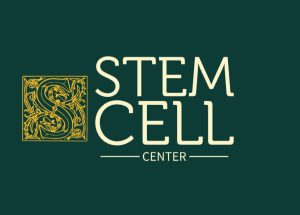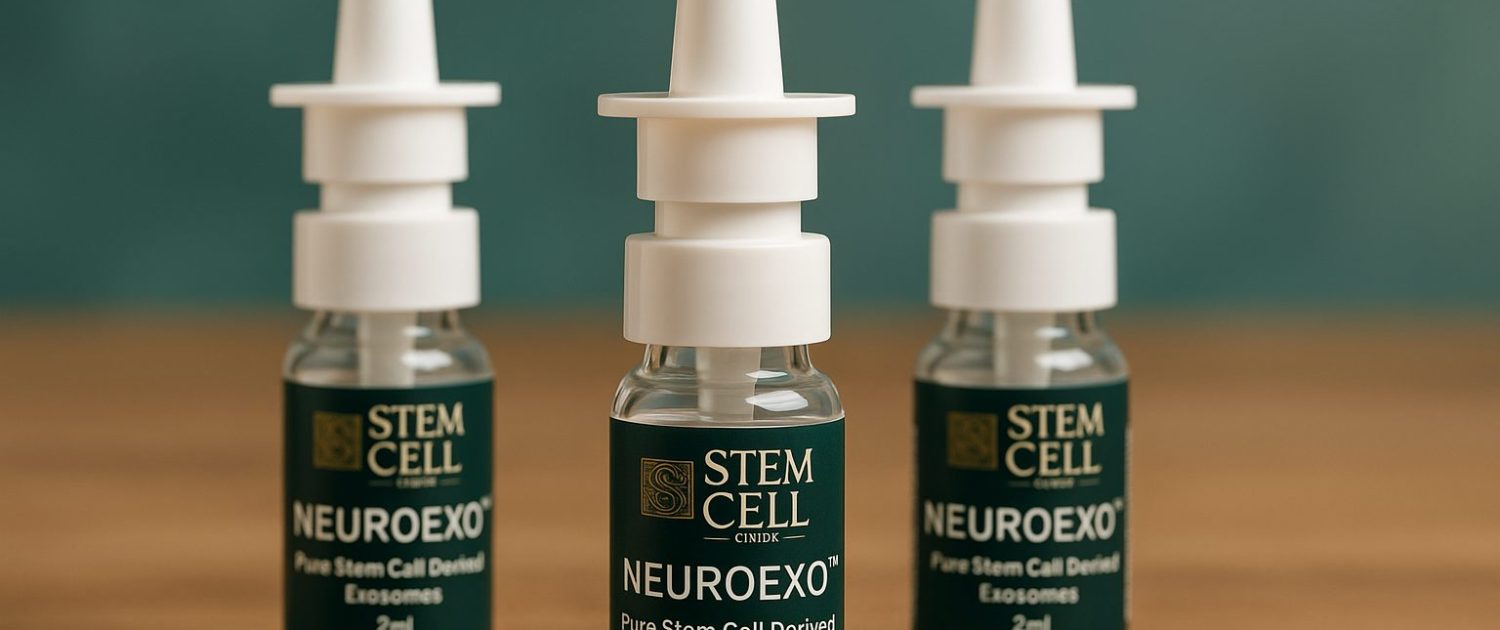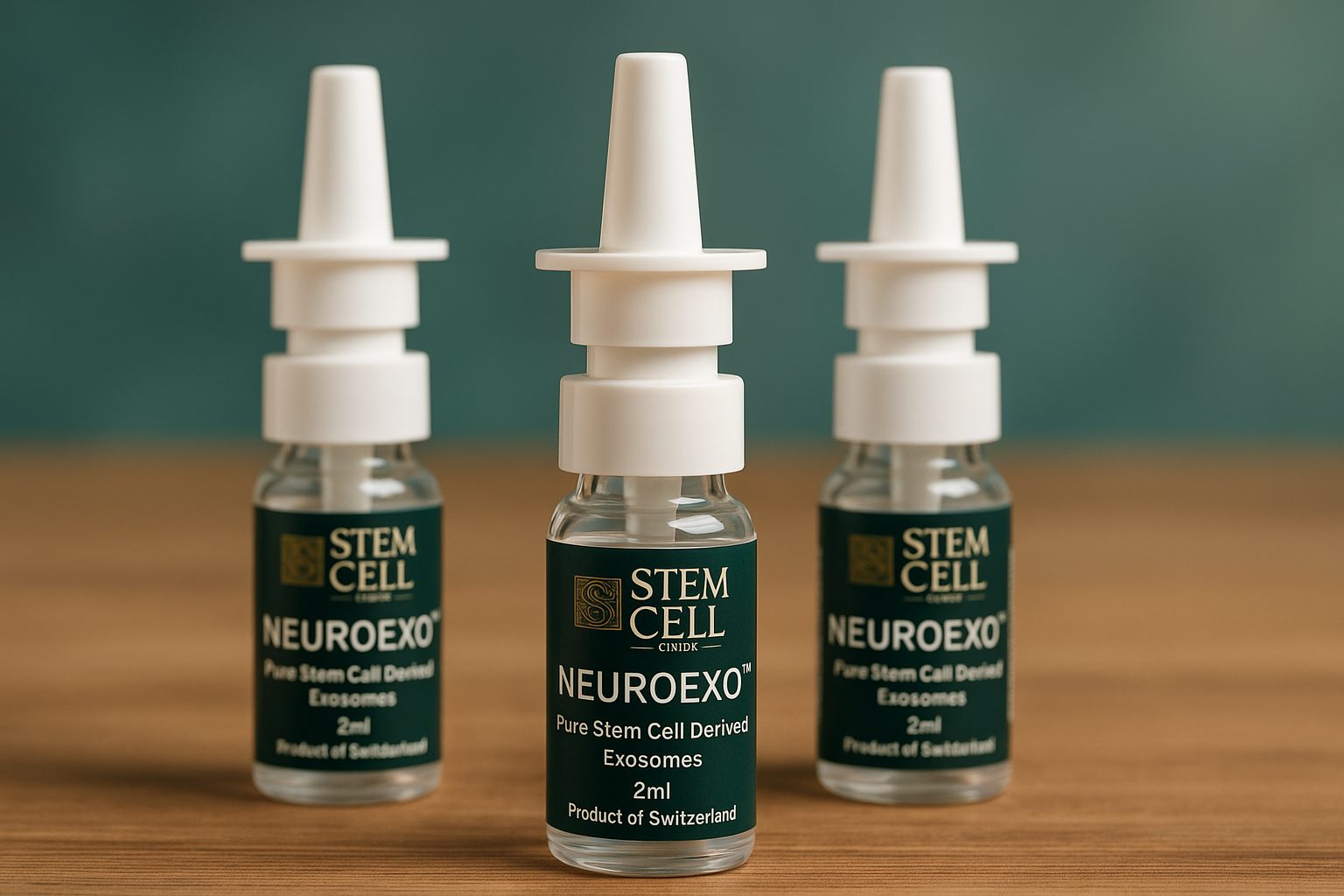What is NeuroExo™ Exosome Nasal Spray?
NeuroExo™ is a clinician-supervised nasal spray of extracellular vesicles (exosomes) derived from Umbilical Cord Mesenchymal Stem Cells (UC-MSC). By using the olfactory and trigeminal pathways, intranasal delivery helps support the brain while bypassing the blood–brain barrier — a route highlighted in recent translational and clinical literature.
How Does It Work?
-
Direct CNS access (nose-to-brain): Intranasal administration provides a practical pathway to the brain that avoids first-pass systemic dilution, discussed widely in contemporary reviews. Lippincott Journals+1
-
Immune & inflammatory balance: MSC-exosomes carry bioactive cargo (miRNAs, proteins, lipids) with immunomodulatory and anti-inflammatory activity relevant to neuroinflammation. PubMed+1
-
Support for synaptic repair & plasticity: Reviews across neurodegenerative fields describe exosome-mediated support for neuronal communication, proteostasis, and network plasticity. BioMed Central+1
Bottom line: NeuroExo™ is a cell-free biologic designed to complement standard care by modulating neuro-immune signals and supporting neural connectivity.
Evidence Based Therapy
What the Human Evidence Says (in plain English)
While large randomized trials are still pending, several human publications give real-world direction:
-
Intranasal exosomes in Alzheimer’s disease (human): An open-label Phase I/II study (NCT04388982) using intranasal adipose-MSC exosomes reported safety and tolerability; authors recommend ≥4×10⁸ particles as a practical dose for future trials. PubMed+1
-
Stem-cell therapy in autism (human): Systematic reviews/meta-analyses of MSC and related cellular therapies in children with ASD show signal of benefit on behavioural scales with acceptable safety, while emphasising heterogeneity and the need for higher-quality trials. Europe PMC+1
-
Case-level human reporting with intranasal component (autism): A 2025 Cureus case report documented multi-modal MSC ± exosome care with caregiver-reported gains across language, social engagement and EEG normalisation; the regimen included intranasal dosing within the programme. Single-case evidence; not definitive, but informative for protocol design. PMC+1
Interpret carefully: Human evidence for intranasal exosomes is strongest for safety/feasibility (Alzheimer’s) and emerging for autism via broader MSC-based care. We position NeuroExo™ as adjunctive to rehabilitation, not a stand-alone cure.
Who NeuroExo™ May Help?
-
Neurodegenerative conditions: Mild–moderate Alzheimer’s disease, Parkinson’s, early cognitive decline — areas with active research on MSC-exosomes and nose-to-brain delivery. PMC+2BioMed Central+2
-
Neuro-inflammatory / post-infectious sequelae: Post-viral brain fog, persistent neuroinflammation — intranasal EVs are being explored for CNS immune modulation. PubMed
-
Neurodevelopmental support: Autism spectrum features and developmental delay — offered as adjunct to OT/SLT/behavioural therapy, drawing on MSC safety data and early translational reports.
Evidence Library
-
Nose-to-brain exosomes (reviews): 2023–2024 updates detailing pathways, feasibility, and clinical prospects. PMC+1
-
Neurodegeneration + MSC-exosomes (reviews): Broad support for anti-inflammatory and neurotrophic roles across AD/PD. BioMed Central+1
-
Autism + stem-cell therapies (human syntheses): Meta-analyses and systematic reviews indicate potential benefits with calls for rigorous RCTs. Europe PMC+1
-
Human intranasal exosome trial: Alzheimer’s Phase I/II, safe and well-tolerated; dose guidance shared for future work. PubMed
-
Case-level human autism reporting (with intranasal component): 2025 case report outlines clinical gains under multi-modal programme. PMC
Safety, Ethics & Regulatory Notes
-
NeuroExo™ is a cell-free biologic (no live cells).
-
Offered under medical supervision as part of a comprehensive programme; not a replacement for approved treatments.
-
Current global guidance treats therapeutic exosomes as biologic/advanced therapy candidates pending further trials; marketing claims should avoid over-promising. (Context: regulators and independent press caution against unproven consumer exosome products.) WIRED
Important DisclaimerNeuroExo™ is a biologic wellness product containing purified UC-MSC exosomes. It is not a drug and not intended to diagnose, treat, cure or prevent disease. Offered only under clinician supervision, with informed consent and objective progress tracking. Results vary.
FAQ
Why intranasal instead of IV?
Nasal delivery taps olfactory/trigeminal routes to reach the brain more directly, as summarised by recent reviews.
How long before we see changes?
Programmes typically run 1–3 months with concurrent OT/SLT/rehab; teams use standardised scales to track progress.
Any side effects?
Published intranasal exosome work in humans reports good tolerability; we screen for nasal inflammation/bleeding and component sensitivities.





